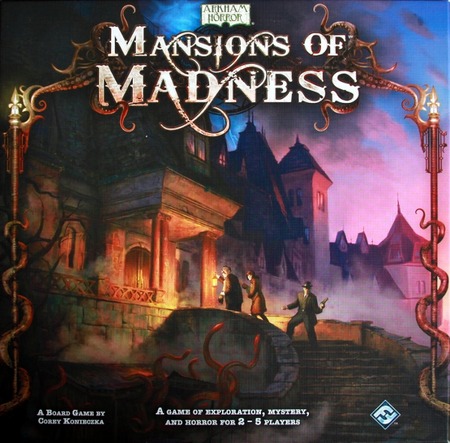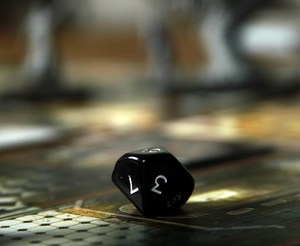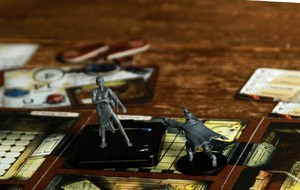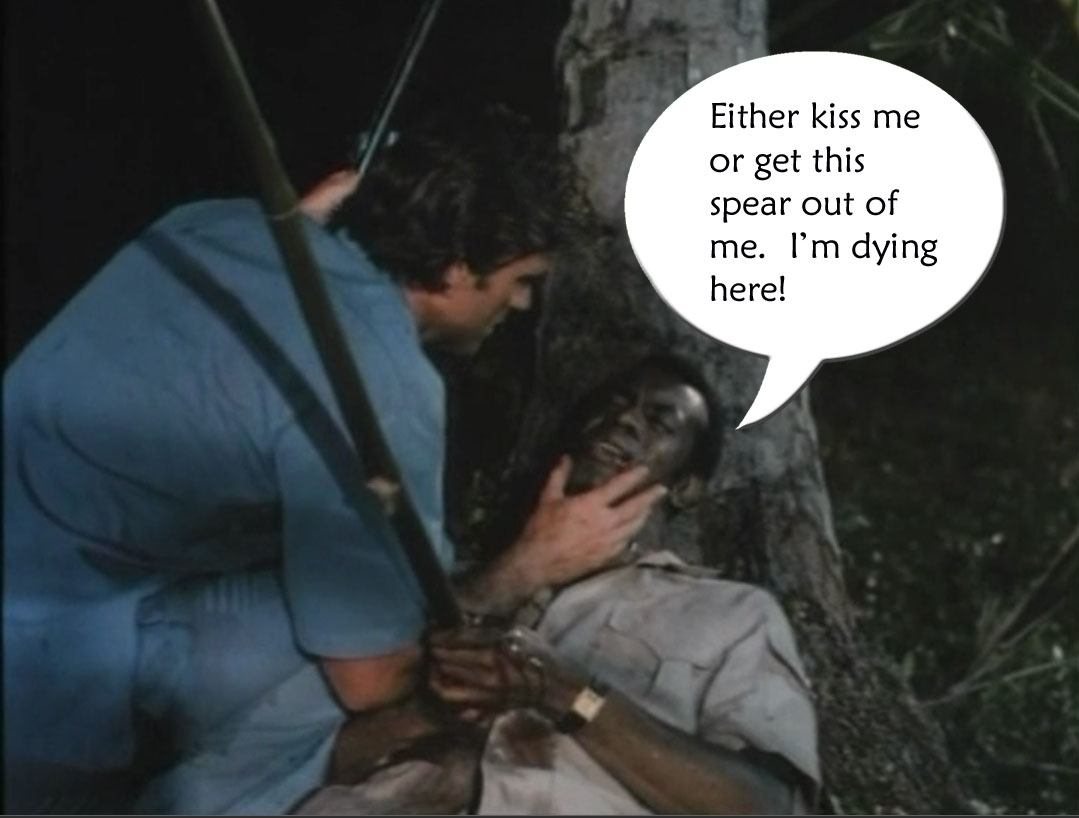
Mansions of Madness is fairly unique in the board game space, as it positions itself as a storytelling game. This started me thinking about story in board games, and how it impacts the play experience. Because Mansions of Madness is so closely tied to the concept of story, I want to give my take on story in games before I start in on my review of the game.
Story in games:
I enjoy a wide gamut of game genres, but when it comes down to it, I have a special affinity with those that are story driven. The game sessions that I fondly remember, and excitedly describe to my friends, always have a strong and compelling emotional element. This makes sense, because without an emotional component there would be no story to tell. When the human element is removed, what remains is no longer a story, but a series of empty machinations. People innately realize that there is a difference between abstract movement and meaningful movement – between description and story. This idea often manifests itself in discussion of board games as “Mechanics vs. Theme”. Mechanics are the movement of the pieces, and the rules that must be followed during play, whereas the theme consists of the art, player motivations, and the real or imaginary ideas that the pieces in the game represent. Many abstract games are accused of having a “pasted on” theme, which is often used as a thinly veiled way of saying th e game does not deliver a story. This is where my opinion of story may differ from the mainstream.
e game does not deliver a story. This is where my opinion of story may differ from the mainstream.
Story can appear under many different guises outside of the typical cut-scenes in video games, or back-story narrative in board games, and is much more pervasive than may be immediately apparent. Even games like the epitomic abstract “Chess” can tell a compelling story through the give and take of positional advantage. In these instances, however, the story isn’t found on the board, or in the pieces, but instead manifests from the interaction between the players, and is facilitated by the mechanics of the game. Even when completely devoid of theme, games can tell stories of loss and victory; clever cunning and missed opportunity; and can hide within their simple interactions the gamut of human emotion. After all, most sports are abstract games that are watched and loved by millions, not for their mechanics, but for the inherent story that is created through the interaction of the players.
When refined into its essence, a game’s story comes from its ability to elicit this emotional response. Theme is often a key ingredient in facilitating these feelings, and does so by enhancing the player’s immersion in the game world, but in the end, theme is still only a tool to help develop the story. The players themselves fill the role of characters within the story of a game, and the emotion that makes the game’s mechanics meaningful must come from within the players. With this in mind, story becomes a non-corporeal concept that rises above simple mechanics and theme, and lives on its own as a separate idea. Story is the brass ring that game designers are reaching to grab, because story is synonymous with player engagement.
There is an ongoing discussion about what makes a good game. The term “Balance” is bandied about a lot in these dialogues. Balance is the perceived fairness in a game; the potential for all players to achieve victory, given the same amount of effort. Some go so far as to say that a game which is unbalanced is fundamentally broken. Unbalanced gameplay can elicit strong emotional response just like a good story, but in many contexts this response can be negative, and directed towards the game itself. The player who experiences this will still relate his gameplay story to others, but this story may very well consist of a string of colorful expletives, and end with the words “never playing again”.
It’s in this situation, however, that theme can actually turn a negative game experience into a positive one. An unbalanced abstract game gives the player no frame of reference as to why the game is unbalanced, and as a result, the player has nowhere to channel his emotional response. But when theme is added to the same game, the player gains a frame of reference which allows him to justify the difference in difficulty; and what was a negative aspect of the abstract game, can become a positive aspect of a themed game. If one player is representing a ragtag band of rebels, and another controlling an oppressive dictatorship, it would make little sense for both sides to be equally balanced from a theme perspective. In fact, by adding that element of skewed odds, the game experience is often made much more emotionally compelling for the players involved.
be equally balanced from a theme perspective. In fact, by adding that element of skewed odds, the game experience is often made much more emotionally compelling for the players involved.
That’s not to say that theme fixes everything, though. The theme of a game is still just a tool to justify the game mechanics. The choices that the player makes must be interesting, and empower him to feel that he is driving the direction of his play experience. There is a term used in film study: “Suspension of Disbelief”. This describes the ability of a film to immerse the viewer so much that he doesn’t notice the limitations of the medium, or discontinuities in the story. This idea can be applied to games as well: A player has a very limited number of decisions that he can make during most games, and he must play within the confines of the game rules and components offered. What amounts to moving bits around a board, and generating random numbers transforms into something much more engrossing during play, because the player looks past the limitations of the cardboard and plastic that make up the game components, and instead becomes immersed within the confines of the game mechanics and theme. If those mechanics become too dull, or are overly complicated, that suspension of disbelief is broken, the game components revert back to being bits of cardboard and plastic, and the player can no longer justify his emotional reaction within the confines of the game.
Getting that perfect mixture of theme and mechanics can be a difficult proposition. There is no magical formula for creating a good game, yet there are a multitude of different paths to achieve compelling gameplay. Not every game hits that mark, but when a game does hit that sweet spot, the experience is sublime.
The Game:
Mansions of Madness is a game designed by Corey Konieczka, and published by Fantasy Flight Games. When it comes to theme, Mansions of Madness has it in spades, even more so than the typical Fantasy Flight fare – and that is saying a lot. Its story-driven design aspires to take that step beyond pure theme, and strives to deliver a marriage of balanced mechanics and story through a uniquely focused gameplay experience.
In Mansions of Madness, players take on the role of individuals who find themselves investigating strange, supernatural events in a creepy mansion.
Click to read more ...
 Wednesday, September 14, 2011 at 06:47PM
Wednesday, September 14, 2011 at 06:47PM  Click to EnbiggenAs many of you already know, Netflix and Starz were unable to make a deal to continue their licensing agreement and, beginning next year, Starz content will not be available for streaming. In one way, this isn't terrible news, since the quality of the Starz streaming seemed worse than average, but Starz will be taking a number of genre films with it, and that is not a good thing. I'm a horror fanatic at heart, so I'll start with those films. Sci-fi and Fantasy losses will be coming soon. I've included a bit of parenthetical commentary for the films, but mostly this is just a FYI post. (By the way, the links go to IMDB unless there is a review here or on The Blackest Eyes, in which case they go to the review).
Click to EnbiggenAs many of you already know, Netflix and Starz were unable to make a deal to continue their licensing agreement and, beginning next year, Starz content will not be available for streaming. In one way, this isn't terrible news, since the quality of the Starz streaming seemed worse than average, but Starz will be taking a number of genre films with it, and that is not a good thing. I'm a horror fanatic at heart, so I'll start with those films. Sci-fi and Fantasy losses will be coming soon. I've included a bit of parenthetical commentary for the films, but mostly this is just a FYI post. (By the way, the links go to IMDB unless there is a review here or on The Blackest Eyes, in which case they go to the review).



